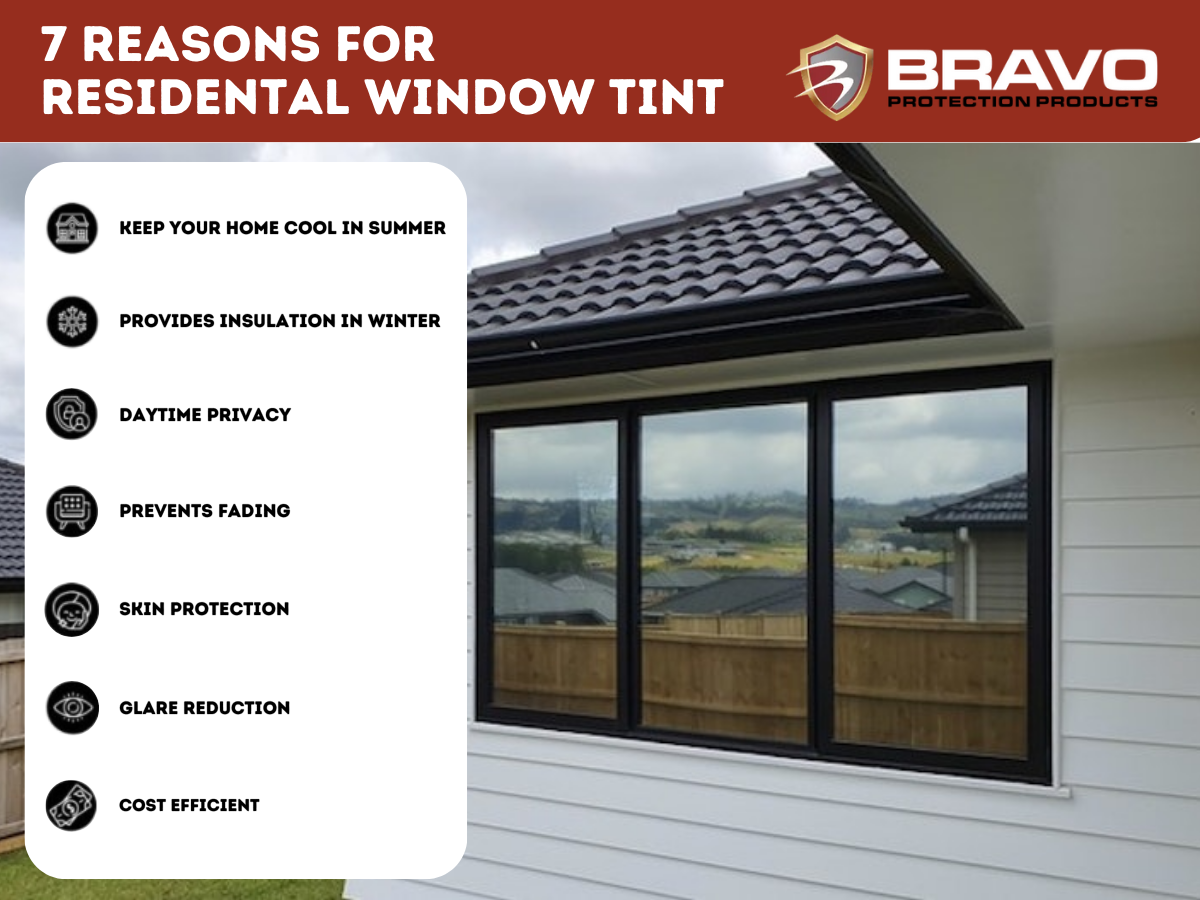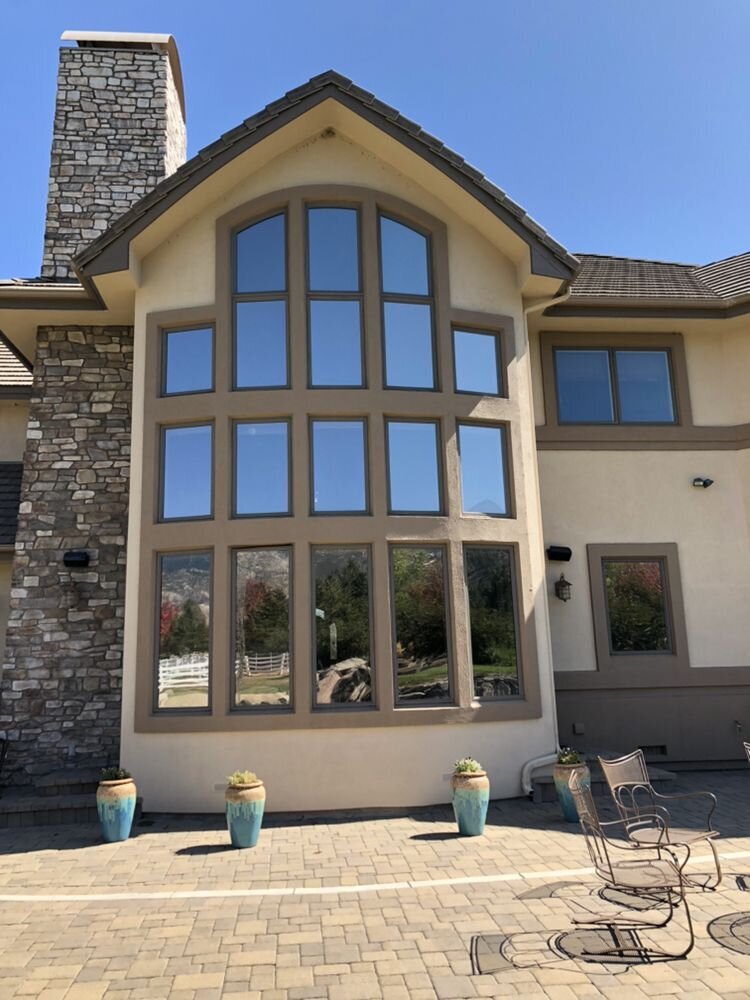Just How Residential Window Tinting Boosts Your Home's Energy Performance
Residential home window tinting offers an engaging solution for property owners seeking to boost power efficiency within their living spaces. By applying specialized films to windows, it successfully lowers warmth transfer, thereby stabilizing indoor temperatures and minimizing the need for excessive heating or cooling.
Understanding Window Tinting
Comprehending window tinting is necessary for home owners looking for to boost both convenience and power performance in their space. Residential Window Tint. Home window tinting includes the application of a thin film to the interior or exterior surface of glass home windows. This film can dramatically modulate the amount of sunshine and warm that goes into a home, therefore influencing indoor climate problems
There are different kinds of window tinting films available, each with distinctive residential properties. The efficiency of home window tinting is commonly measured by its Visible Light Transmission (VLT) portion, which indicates just how much light can pass with the film.
Benefits of Power Efficiency
Home window tinting not only improves aesthetic appeals but additionally plays a considerable duty in enhancing energy performance within property rooms. By minimizing warmth transfer with windows, tinted films develop a more steady indoor environment, which can cause substantial reductions in power consumption for heating & cooling. This power efficiency equates right into lower energy expenses, giving property owners with considerable lasting savings.

Additionally, home window tinting enhances the comfort of living rooms. By lessening glare and obstructing dangerous UV rays, tinted windows produce a more positive atmosphere, which can result in improved health for owners. The defense versus UV rays also assists maintain furnishings and flooring from fading, adding to the long life of family things.
Just How Tinting Works
Tinting movies run with a combination of innovative materials and modern technologies created to control the quantity of solar power getting in a home. Mainly made up of polyester, these films commonly incorporate metal or ceramic bits that absorb and mirror heat. This double capability enables them to dramatically lower the penetration of ultraviolet (UV) rays and infrared radiation while allowing noticeable light to go through.
The performance of home window tinting is gauged by its solar heat gain coefficient (SHGC), which suggests just how much solar power is transferred via the window. Reduced SHGC values are more suitable as they signify better heat denial. Your Domain Name Furthermore, window colors can include a variety of shades, permitting homeowners to tailor their aesthetic choices while boosting energy effectiveness.
In addition, these movies act as a barrier, avoiding heat loss throughout colder months by reflecting interior warmth back into the home. This thermal insulation impact complements the cooling benefits gained during warmer months, adding to a well balanced interior environment year-round. By taking care of solar power successfully, domestic window tinting not only enhances comfort but also plays an important function in decreasing energy consumption and lowering energy bills.
Choosing the Right Tint

There are various sorts of window movies available, consisting of colored, metalized, and ceramic. Dyed films are cost-efficient but may have restricted sturdiness. Metalized movies offer much better warmth rejection but can interfere with digital signals. Ceramic movies provide exceptional warmth control without endangering visibility and are extremely long lasting, making them a preferred choice.
Visible light transmission (VLT) is another important aspect, as it suggests the quantity of natural light that can travel through the colored glass. Home owners need to pick a color with a VLT that enhances their lighting preferences while still supplying appropriate glare reduction.
Furthermore, assessing the solar warm gain coefficient (SHGC) can assist identify how well a tint can obstruct warm from sunshine. A lower SHGC indicates better heat control, inevitably improving energy efficiency.
Installation and Upkeep Tips
Correct installation and upkeep are vital parts in making best use of the advantages of domestic home window tinting. To accomplish optimal outcomes, it is a good idea to hire a certified expert for installment. This makes sure that the tint is used properly, staying clear of air bubbles, wrinkles, or imbalance that could endanger performance. Specialists likewise make use of specialized tools and techniques, which can enhance the longevity and efficiency of the color.
Following setup, upkeep is important to extend the life of the home window movie. It is advised to wait at the very least 30 days before cleaning the colored windows to allow the adhesive to cure completely.
Furthermore, regular evaluations are beneficial. Look for any kind of peeling or bubbling, which can show inappropriate setup or put on with time - Residential Window Tint. Resolving these address issues promptly can stop more damages and maintain energy effectiveness. By adhering to these installation and upkeep pointers, home owners can guarantee their home window tinting continues to offer considerable energy cost savings and comfort for important site many years to find.
Final Thought
In final thought, household window tinting offers as an effective option for boosting power effectiveness within homes. By reducing warm transfer and obstructing harmful UV rays, window films add to lower energy usage and boosted indoor convenience.
Home window tinting involves the application of a thin movie to the inside or exterior surface area of glass windows. By minimizing warmth transfer through windows, tinted movies produce an extra secure indoor climate, which can lead to considerable decreases in power usage for home heating and air conditioning.The effectiveness of window tinting is measured by its solar warm gain coefficient (SHGC), which suggests how much solar energy is transferred with the home window. By taking care of solar power properly, property home window tinting not just boosts convenience yet also plays a vital role in minimizing energy consumption and lowering utility bills.
By minimizing warm transfer and obstructing unsafe UV rays, home window movies add to decrease power intake and boosted interior convenience.